Saturday, September 22, 2007
SCAT
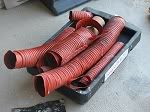 Here's a bucket of old SCAT. SCAT is a type of flexible ducting made from silicone impregnated fabric around a spiral wire core. It is used to conduct air from various intakes to sources such as cabin fresh air and heat and carburetor air and heat. It's lightweight and pretty durable, but it does tend to come apart after many years, particularly when exposed to things like engine oil. Most of Yellowbird's SCAT predates our relationship and is ripe for replacement. I can't fly her with no engine, so I guess it's time for another grounded airplane project.
Here's a bucket of old SCAT. SCAT is a type of flexible ducting made from silicone impregnated fabric around a spiral wire core. It is used to conduct air from various intakes to sources such as cabin fresh air and heat and carburetor air and heat. It's lightweight and pretty durable, but it does tend to come apart after many years, particularly when exposed to things like engine oil. Most of Yellowbird's SCAT predates our relationship and is ripe for replacement. I can't fly her with no engine, so I guess it's time for another grounded airplane project.
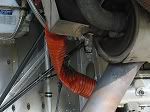 When SCAT goes bad. This is the carburetor heat duct. It runs from the carb heat shroud (the box at top center) to the carburetor air box (the aluminum thing lurking behind the exhaust pipe). This was an inflight failure back in June of 2004, brought about when I applied carb heat during cruise on a humid day. The fabric tube had come unbonded from the spiral wire core, and the sudden suction from the carburetor caused the duct to collapse. This shut down the engine pretty quickly, and fired up my adrenaline glands just as effectively. Shutting off the carburetor heat brought the engine back to life, but it was some time before my pulse was back to normal.
When SCAT goes bad. This is the carburetor heat duct. It runs from the carb heat shroud (the box at top center) to the carburetor air box (the aluminum thing lurking behind the exhaust pipe). This was an inflight failure back in June of 2004, brought about when I applied carb heat during cruise on a humid day. The fabric tube had come unbonded from the spiral wire core, and the sudden suction from the carburetor caused the duct to collapse. This shut down the engine pretty quickly, and fired up my adrenaline glands just as effectively. Shutting off the carburetor heat brought the engine back to life, but it was some time before my pulse was back to normal.
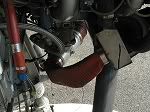 Another view, showing both ends. The duct was completely flattened for several inches. The wire core was squashed like a broken Slinky and the glass fiber cord wrapping the duct had also come loose at both ends, probably due to being soaked with oil from assorted leaks at the back of the engine. This is why you should keep your SCAT clean and have it inspected regularly by a qualified SCATologist.
Another view, showing both ends. The duct was completely flattened for several inches. The wire core was squashed like a broken Slinky and the glass fiber cord wrapping the duct had also come loose at both ends, probably due to being soaked with oil from assorted leaks at the back of the engine. This is why you should keep your SCAT clean and have it inspected regularly by a qualified SCATologist.
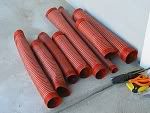 Fresh SCAT. Measure twice, cut once is the rule, followed by start over because you transposed the digits in the notebook after measuring. Fortunately, it's not that expensive, but I am stuck with a couple of too-short lengths of brand new SCAT. For a little extra security, I bonded spare SCAT fabric over each end with DC 736 high temperature RTV sealant to keep the ends from coming undone like the old carb heat duct. It's little touches like this that keep one occupied on lovely autumn days when everyone else is up flying.
Fresh SCAT. Measure twice, cut once is the rule, followed by start over because you transposed the digits in the notebook after measuring. Fortunately, it's not that expensive, but I am stuck with a couple of too-short lengths of brand new SCAT. For a little extra security, I bonded spare SCAT fabric over each end with DC 736 high temperature RTV sealant to keep the ends from coming undone like the old carb heat duct. It's little touches like this that keep one occupied on lovely autumn days when everyone else is up flying.
Sunday, September 16, 2007
Housework
The poor girl is in the shop and the prognosis is that she'll be there for at least a month, possibly two. Since I can't fly her, I might as well clean her up a bit while she's dissembled. A couple of years ago, I painted the top cowl during a long winter weekend. I now have access to the engine cooling baffles, prop spinner and bulkhead, and other assorted airplane parts that were removed when the engine was pulled. I also have a new apartment with a smaller Bachelor Kitchen. It's too small for airplane work, but I have a nice airy balcony that will provide plenty of room and much better ventilation.
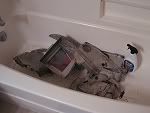 A bathtub full of baffles. They're pretty dingy, all covered with baked on gunk and patches of surface corrosion. The first step is to give them a good cleaning with Simple Green (the aircraft-friendly formulation). This stuff does wonders towards removing anything that hasn't yet fossilized.
A bathtub full of baffles. They're pretty dingy, all covered with baked on gunk and patches of surface corrosion. The first step is to give them a good cleaning with Simple Green (the aircraft-friendly formulation). This stuff does wonders towards removing anything that hasn't yet fossilized.
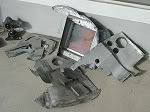 Clean and dry, but still pretty messy. Next, we'll give them a soak in Alumiprep, a phosphoric based acidic cleaner used for cleaning, brightening and etching aluminum. This is pretty nasty stuff, so the job gets done outside on the balcony.
Clean and dry, but still pretty messy. Next, we'll give them a soak in Alumiprep, a phosphoric based acidic cleaner used for cleaning, brightening and etching aluminum. This is pretty nasty stuff, so the job gets done outside on the balcony.
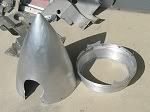 The prop spinner and bulkhead also get treated. I stripped the spinner last year and primed the inside while leaving the outside unpainted. I could never get it polished enough to look shiny, so I might as well paint it. After a good scrub with the Alumiprep, they look almost new again.
The prop spinner and bulkhead also get treated. I stripped the spinner last year and primed the inside while leaving the outside unpainted. I could never get it polished enough to look shiny, so I might as well paint it. After a good scrub with the Alumiprep, they look almost new again.
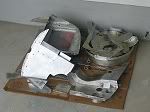 Next, a coat of Alodine is applied to give some resistance to corrosion. This leaves a nice golden brown coloring to the treated surfaces. Again, this is best done outdoors and with appropriate personal protection from exposure to the chemicals.
Next, a coat of Alodine is applied to give some resistance to corrosion. This leaves a nice golden brown coloring to the treated surfaces. Again, this is best done outdoors and with appropriate personal protection from exposure to the chemicals.
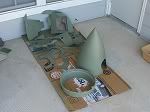 Everything gets a few coats of self-etching primer. I could leave it like this for that military surplus look. I'd change her name to Camobird.
Everything gets a few coats of self-etching primer. I could leave it like this for that military surplus look. I'd change her name to Camobird.
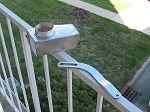 There's nothing more exciting than watching paint dry, but I took a few extra minutes to clean the carb heat shroud and alternator bracket. Love those nice shiny airplane parts!
There's nothing more exciting than watching paint dry, but I took a few extra minutes to clean the carb heat shroud and alternator bracket. Love those nice shiny airplane parts!
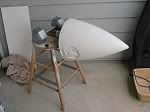 Here's my custom support rig for painting the spinner. It doubles as a stool and home gym.
Here's my custom support rig for painting the spinner. It doubles as a stool and home gym.
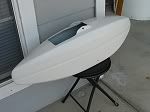 After dragging the repaired nosewheel pant around for a year, it's time to paint it also.
After dragging the repaired nosewheel pant around for a year, it's time to paint it also.
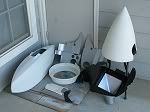 All finished for now, The baffles are done in high temperature aluminum, with satin black for the parts visible through the cowl openings. Now I need to find a match for Yellowbird Yellow to finish the nosewheel pant.
All finished for now, The baffles are done in high temperature aluminum, with satin black for the parts visible through the cowl openings. Now I need to find a match for Yellowbird Yellow to finish the nosewheel pant.
